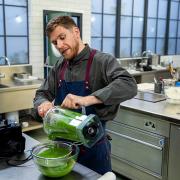As Christmas approaches, we takes a seasonal look at the very broad topic of investing in wine, with help and guidance from experts Wilf Mould and Miles Corish
Vintage wines conjure up images of damp cellars full of dusty bottles on cobwebbed racks.
But Miles Corish and Wilf Mould agree that the key starting point for anyone investing in wine for the long term, whether at auction or from a wine merchant, is the condition it has been kept in and, in turn, the condition of the bottle and its contents.
Ullage is not a word we use a lot in everyday conversation but it is important. It refers to changes in the space between the cork and the wine in the neck of the bottle. This could point to leakage or evaporation.
‘The bottle, cork and labels need to look as new,’ says Wilf, ‘and there should be little or no ullage in the neck of the bottle as that’s an indicator that it hasn’t been stored in the right way.’
Miles adds: ‘It’s the provenance – wherever you are sourcing your wine from, you need to ensure that it has been stored at an ideal temperature of around 15 degrees centigrade and laid flat so there is no ullage.’
The key advantage of buying wine at auction is price – there are some real bargains to be had out there and it is very easy to compare saleroom prices with the retail price of a particular bottle and its year of vintage – and hunt down some special wines for either laying down to mature or for drinking straightaway.
Wines will often come to auction after someone has died and, because the Exchequer regards wine as ‘wasted chattel’, it is capital gains tax-free. This is also a positive thing for the future if you are considering buying wines to leave in your will to another family member.
You must always remember, though, when deciding how much you are willing to bid for a bottle, to factor in the auction house’s commission and any other charges. Another key plus for buying in the saleroom is that you will often find rare and difficult to find wines you would not be able to obtain easily from a wine merchant or retailer.
The big names for the serious investor are highly regarded wines from classic regions such as Bordeaux, Burgundy and increasingly, Italy. ‘We get some very good wines through our saleroom at Silverwoods and you can create ‘alerts’ through the saleroom.com website for particular bottles that you are looking for. But anyone who is really keen will also be keeping an eye out for specialist wine auctions run by Straker and Chadwick and Christies,’ says Wilf.
‘One of the downsides with the classic marques is that, over the last ten years, interest from the Chinese and speculative investors has driven prices sky high. In recent times however, prices have come back a little, making now a good time to look at making purchases,’ says Miles, who is firmly of the opinion that a serious investor develops a really good ongoing relationship with a reputable wine merchant.
‘What you decide to put your money in will very much depend on your personal taste but, in order to see a year-on-year increase of 10% in your wine’s value, which is what you should be aiming for, you really need to buy carefully to get the best wine for the best price. If I were to put forward some general recommendations, they would be to steer clear of white wines and sauternes and instead look to the best names from Tuscany, a select band of top Rhone producers and as mentioned before, revisiting Bordeaux. And you can rarely go wrong with good vintage champagne,’ he advises.
While there are people out there who can afford to buy and drink a £5,000 bottle of wine, this sum would be a sound budget to start a really good collection.
Miles has a word of caution. ‘The industry is not very tightly regulated and I have heard some real horror stories of incidents where people have sunk money into wine offered to them by cold callers and, in the worst cases, lost a lot of money. Even in the best instances, they have often paid way over the going rate,’ he adds.
Wilf says: ‘The other costs you will also need to factor into your investment schedule are whether the wine is being held ‘in bond’ because, if it is, there will be an additional tax to be taken into consideration. When selling your wine, there will be the commission from the auction house or broker to take account of as well.’.
And when you have got your delicious bottle or bottles home, the starting point now becomes the end point. ‘You must take care to store your wine carefully to be sure of realising your investment, whether thinking of selling on and benefiting financially or drinking in a year or so,’ says Miles.
‘You need somewhere with a constant temperature and little humidity where the bottles can be laid flat - a cool cupboard under the stairs, a cellar if you have one that is dry, or a little used north facing bedroom would be good options. Your kitchen and living room are the very worst places in your house for keeping wine!’



























